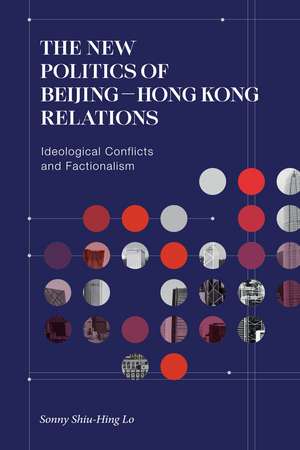The New Politics of Beijing–Hong Kong Relations: Ideological Conflicts and Factionalism
Autor Sonny Shiu-Hing Loen Limba Engleză Hardback – 5 iun 2024
The New Politics of Beijing–Hong Kong Relations particularly examines the paternalistic authoritarianism that can be seen in Beijing's policy toward Hong Kong since the promulgation of the national security law in late June 2020. Lo analyzes the ideological shift from liberal nationalism to conservative nationalism on the mainland Chinese side since late 2012. The increasingly radical localism on the Hong Kong side after 2014 altered Beijing-Hong Kong relations and introduced factional struggles. While the imposition of the national security law into Hong Kong in late June 2020 has stabilized the city politically, Beijing's policy toward Hong Kong is now guided by the principles of protecting its national security and maintaining economic pragmatism, with implications for Beijing's relations with Taipei in the coming years.
Preț: 499.22 lei
Preț vechi: 616.32 lei
-19% Nou
Puncte Express: 749
Preț estimativ în valută:
95.53€ • 102.15$ • 79.65£
95.53€ • 102.15$ • 79.65£
Cartea se retipărește
Doresc să fiu notificat când acest titlu va fi disponibil:
Se trimite...
Preluare comenzi: 021 569.72.76
Specificații
ISBN-13: 9789888805723
ISBN-10: 988880572X
Pagini: 304
Ilustrații: 3 halftones, 12 tables
Dimensiuni: 152 x 229 mm
Greutate: 0.45 kg
Editura: Hong Kong University Press
Colecția Hong Kong University Press
ISBN-10: 988880572X
Pagini: 304
Ilustrații: 3 halftones, 12 tables
Dimensiuni: 152 x 229 mm
Greutate: 0.45 kg
Editura: Hong Kong University Press
Colecția Hong Kong University Press
Notă biografică
Sonny Shiu-Hing Lo is professor and deputy director of HKU SPACE, and an acting principal of the HKU SPACE Community College.
Cuprins
List of Figures and Tables vi
Acknowledgments viii
List of Abbreviations xi
Introduction 1
1. Chinese Politics and Its Implications for Beijing–Hong Kong Relations 10
2. Ideologies and Factionalism in Beijing–Hong Kong Relations 70
3. Beijing’s Comprehensive Jurisdiction, Sino-Western Value Clashes,
and Hong Kong Elections from 2021 to 2023: Implications for Taiwan 180
Conclusion 229
Bibliography 255
Index 281
Acknowledgments viii
List of Abbreviations xi
Introduction 1
1. Chinese Politics and Its Implications for Beijing–Hong Kong Relations 10
2. Ideologies and Factionalism in Beijing–Hong Kong Relations 70
3. Beijing’s Comprehensive Jurisdiction, Sino-Western Value Clashes,
and Hong Kong Elections from 2021 to 2023: Implications for Taiwan 180
Conclusion 229
Bibliography 255
Index 281
